In this article, we are going to look at some of the best high-end electric guitars that money can buy. You can expect to find electric guitars across different brands and styles, and their prices will mostly be in the $2000 to $10,000 range.
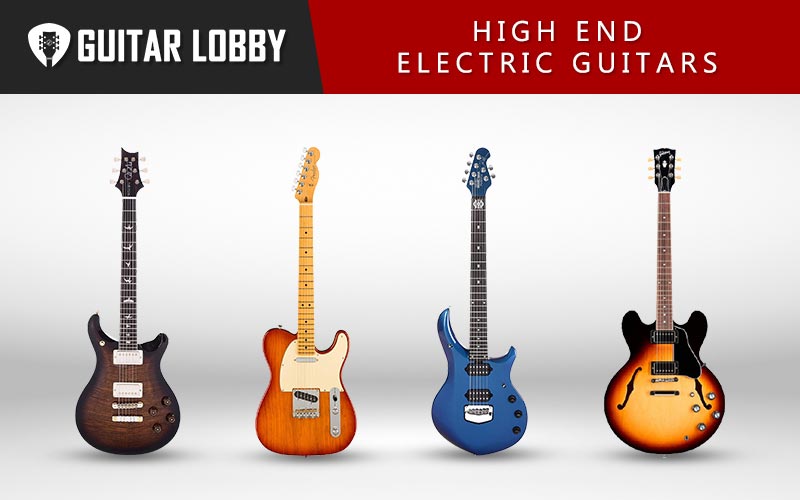
The electric guitars on this list will have some of the best specs and features out there, and these guitars will mostly be used by advanced guitar players or professional guitarists. Of course, if money is not a limiting factor for you, any one of these guitars will be an amazing addition to your collection.
The top three electric guitar brands that will be on this list are Fender, Gibson, and PRS. Fender and Gibson are the real OGs, and they have been around from the very beginning of electric guitar history.
Both brands tend to mainly produce medium to high price electric guitars that are the most iconic guitars that we know of, such as Fender Stratocaster or Gibson Les Paul. PRS on the other hand, came much later than Fender or Gibson.
PRS is a brand that only produces high-end guitars, and PRS creates some of the most “perfect” electric guitars today. Some of the other brands you might find in this list include brands like Ernie Ball Music Man, and D’angelico.
| Name of Product | Image of Product | Description | Price Range | Full Review |
|---|---|---|---|---|
| 1. Gibson ES-335 | 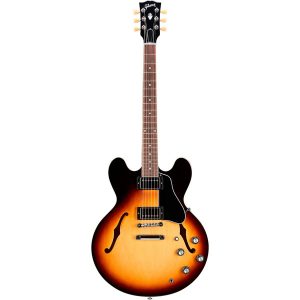 | Body Style: Double Cutaway Semi-hollow Body Top: 3-piece Maple/Poplar/Maple | $3000 | Read Full Review Below |
| 2. PRS Custom 24 | 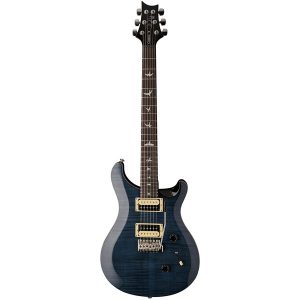 | Body Style: Double Cutaway Solid Body Top: Carved figured maple | $3850 | Read Full Review Below |
| 3. Fender American Professional Stratocaster | 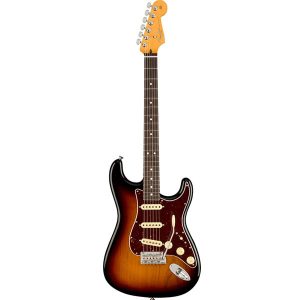 | Body Style: Double Cutaway Solid Body Top: Alder | $1450 | Read Full Review Below |
| 4. Fender American Professional Telecaster | 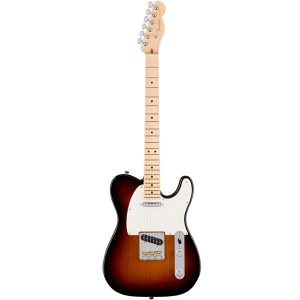 | Body Style: Single Cutaway Top: Alder | $1450 | Read Full Review Below |
| 5. PRS McCarty 594 | 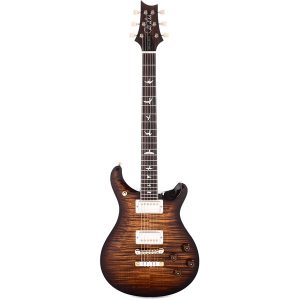 | Body Style: Double Cutaway Solid Body Top: Curly Maple | $4300 | Read Full Review Below |
| 6. PRS John Mayer Silver Sky |  | Body Style: Double Cutaway Solid Body Body Wood: Alder | $2300 | Read Full Review Below |
| 7. PRS Tremonti | 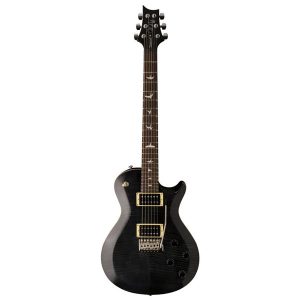 | Body Style: Single Cutaway Top: Carved Figured Maple | $3700 | Read Full Review Below |
| 8. Ernie Ball Music Man John Petrucci Majesty | 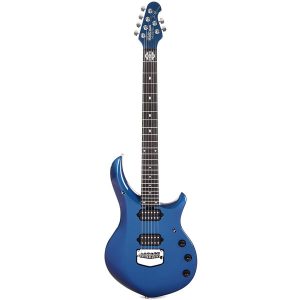 | Body Style: Double Cutaway Top: Mahogany | $3500 | Read Full Review Below |
| 9. D'angelico Excel Series SS Semi-Hollow with Stopbar Tailpiece | 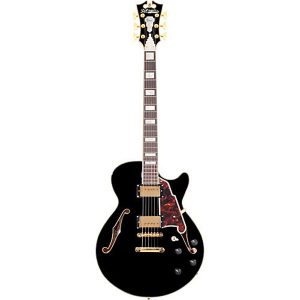 | Body Style: Single Cutaway Top: Maple | $1800 | Read Full Review Below |
| 10. Gibson SG Standard ‘61 | 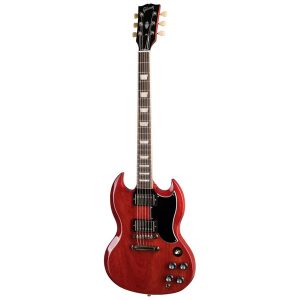 | Body Style: Double Cutaway Top: Mahogany | $1800 | Read Full Review Below |
| 11. Gibson Les Paul Standard 60s | 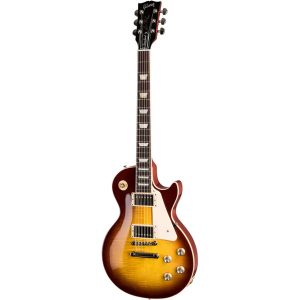 | Body Style: Single Cutaway Top: AA Figured Maple | $2500 | Read Full Review Below |
Here Are the Best Expensive and High-End Electric Guitars
1. PRS Custom 24
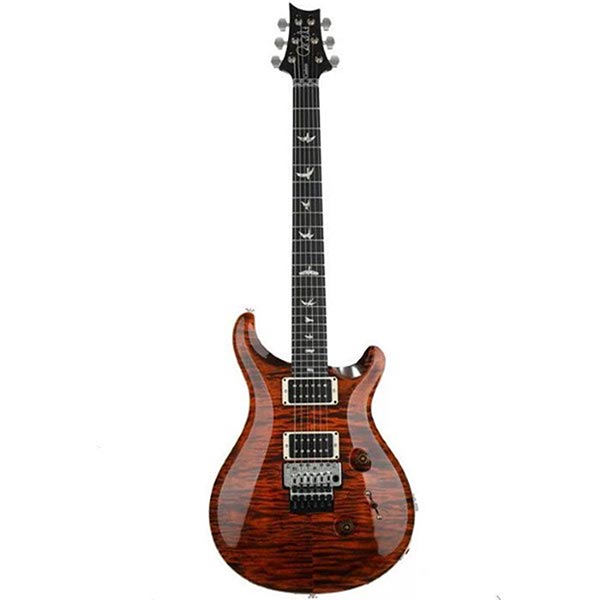
| Estimated Price | $4000 to $5000 |
| Body Style | Double Cutaway Solid Body |
| Top | Carved figured maple |
| Back and Sides | Mahogany |
| Neck | (Pattern Regular) |
| Fret Count | 24 |
| Pickups | PRS 58/15 Bass and 58/15 Treble Humbucker Pickups |
My Review: PRS has been the gold standard of high-end guitars for the past couple of decades, and they have had massive success for a while now. Their models are largely inspired by Fender and Gibson signature guitars, and you can almost think of PRS guitars as a combination of Fender Stratocaster and Gibson Les Paul guitars.
PRS combined their favorite parts of both Fender and Gibson and added their own in-house groundbreaking technology into the guitar.
The PRS Custom 24 is the first guitar that PRS released in 1985, and it still remains the most popular guitar sold by PRS. It was a guitar that combined both Fender Stratocaster and Gibson Les Paul, and it’s a guitar that was meant to be used for multiple styles of music.
The PRS Custom 24 came with many groundbreaking features at the time, and for the 30+ years that they have been sold in the market, it has been refined and changed into the PRS Custom 24 that we know of today. You can expect this guitar to excel with genres like rock, blues, pop, jazz, and funk, and you can find this guitar in the hands of guitarists like John Mayer, Orianthi, and Al Di Meola.
The PRS Custom 24 provides the highest quality that can be used as a high-end touring and recording guitar for professionals and advanced guitarists. If you love this guitar but the price is way above your price range, there is also a cheaper version of this guitar.
Key Specs and Features: First by looking at the body, the PRS Custom 24 has a very ergonomic body shape that is reminiscent of both Fender Stratocaster and a Gibson Les Paul. The design of the body makes the guitar extremely lightweight but very resonant at the same time.
Because of the ergonomic design, the guitar sits very comfortable when you play it sitting down. And just like a classic Gibson guitar, the body is mostly mahogany and the top is finished with carved figured maple top. The fretboard is rosewood with a 25-inch scale length.
You can also expect the best quality hardware on this guitar such as the top-quality bridge and locking tuners on this guitar. It features PRS Gen III Tremolo bar and PRS Phase III Locking Tuner, both of which are designed and manufactured by PRS themselves. They are very functional, and it provides a super stable whammy bar that won’t go out of tune even after wild bends and hardcore playing.
Electronics: The PRS Custom 24 is equipped with relatively new PRS 58/15 pickups. 58 represents 1958, meaning they were trying to recreate humbuckers from 1958 but also improve and make their own changes. These pickups are very clear in the high midrange and have less low mid-range, and are also strong on the bass frequencies. This makes each note of the guitar sing, and the sound of the guitar will easily cut through the mix.
PRS Custom 24 offers five unique pickup positions. The first position is the bridge humbucker, the second position is the bridge humbucker with the neck single-coil (in parallel), the third position is bridge & neck humbucker, the fourth position is neck single coil with bridge single-coil (in parallel), and finally, the fifth position is neck humbucker.
These positions were designed by PRS to give the players a great-sounding single-coil guitar tone while also getting an excellent humbucker guitar sound as well.
The second and fourth pickup position is very unique in that you get to experience a complete single coil sound (neck single + bridge single) and a mix of both single-coil and humbucker sound. With these combinations, you have access to a much wider palette of guitar tone than your regular Gibson Les Paul or Fender Stratocaster.
Bottom Line: It’s easy to see why the PRS Custom 24 has been so popular for 20+ years, and the guitar is almost close to perfect – best quality tonewoods, ergonomic body shape, super versatile tone and high-tech hardware that can last a lifetime.
The PRS Custom 24 is a great example of a great high-end guitar, and it’s worth every bit of the $3600 market price. To the guitarists that need top-quality electric guitar for recording session work or touring, PRS Custom 24 is an amazing choice.
Popular Related Article: The 17 Best High-End Acoustic Guitars
2. Gibson Shop 1959 Les Paul Standard Reissue – Murphy Lab
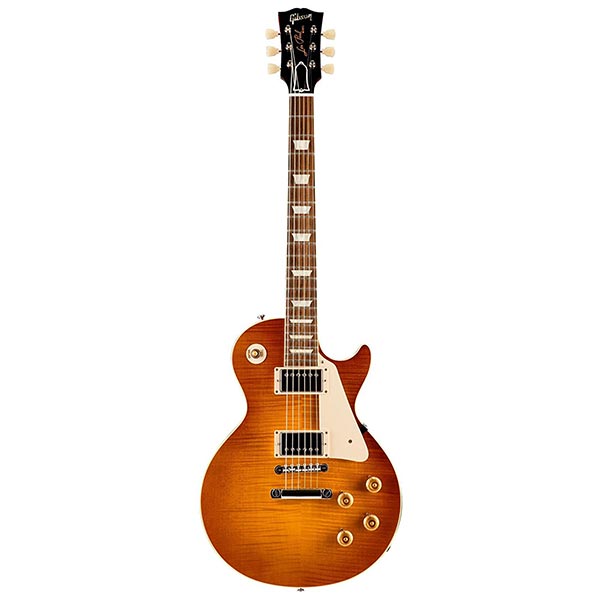
| Estimated Price | $9,000 |
| Body Style | 1959 Les Paul Standard Solidbody |
| Top | 2-Piece Figured Maple |
| Back and Sides | Mahogany |
| Neck | ’59 Medium C |
| Fret Count | 22 |
| Pickups | 2 x Custombucker Alnico 3 Humbuckers |
My Review: For myself and many other Gibson fanatics, the Les Paul Standard from 1959 represents the pinnacle of electric guitars. I was therefore extremely excited to take a closer look at this reissue model and to see whether it lives up to the legendary reputation of the original.
I found myself instantly awestruck by the authenticity of this solidbody guitar – not only because it looked incredibly similar to the ’59 Les Paul Standard, but also because its arsenal of tones and sonic qualities are almost identically matched.
The ’59 “C” profile neck is highly playable and facilitates a wide range of techniques and styles. Whether you’re looking for country twang, or need a suitable axe for fast shredding and screaming solos, the 1959 Les Paul Standard Reissue can do it all.
Upon further inspection, I discovered that a large contributor to the authentically vintage look and feel of this reissue model the unique aging process it has been subjected to. Gibson used innovative methods to create a slightly worn, retro appearance to get as close to the classic version as possible.
Key Specs and Features: It didn’t take long for me to realize that the finest tonewood blends had been used to construct this Les Paul Standard Reissue. The body is made from mahogany, which keeps the overall weight of the guitar on the lighter side and allows you to play for long sessions without experiencing fatigue.
Additionally, Gibson has used several components which stay true to the late ‘50s period of the original model. These include Kluson tuners, a worn pickguard, and the same inlays which were featured on the 1959 Les Paul Standard.
Electronics: After hearing the tone of this guitar for the first time, I was amazed at how much power and clarity the pickups produced without any noise issues. With two identical Custombucker Alnico 3 humbuckers in the bridge and neck positions, Gibson has managed to recreate their vintage tone very convincingly.
Bottom Line: There’s something about the ’59 Les Paul that makes it one of the most iconic solidbody guitars to ever be produced. That ineffable quality has been translated into this reissue model brilliantly by Gibson.
You can expect all of the classic Les Paul qualities from this guitar – endless sustain, warm mids, and high-gain compatibility. It’s one of the most expensive guitars out there but well worth the price tag.
3. Ibanez PIA Steve Vai Signature
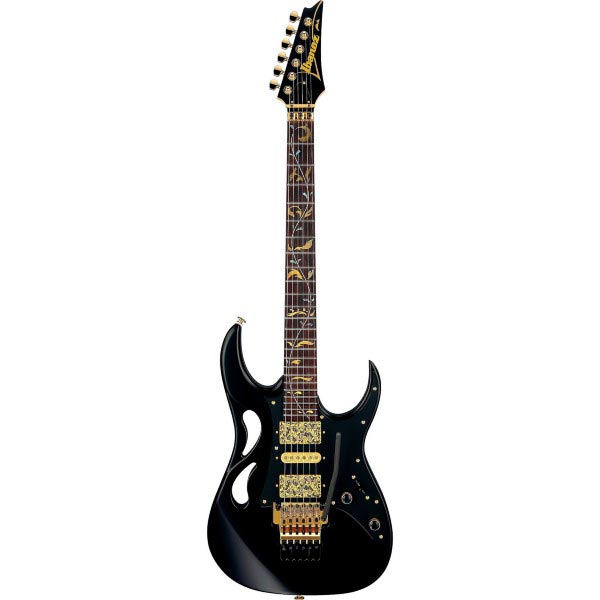
| Estimated Price | $3,500 |
| Body Style | Steve Vai Signature Solidbody |
| Top | Alder |
| Back and Sides | Alder |
| Neck | PIA |
| Fret Count | 24 |
| Pickups | 2 x DiMarzio UtoPIA Humbucker & DiMarzio UtoPIA Single-Coil |
My Review: Listening to Steve Vai play guitar is a true privilege, so it’s no reprise that his signature model, made by Ibanez, is a wonderful creation. The virtuosic musician is renowned for his incredibly fast playing techniques and control, so he set out to design a guitar that facilitates these disciplines.
The Steve Vai Signature arguably possesses the fastest neck that Ibanez has ever produced. That’s a huge compliment, considering that the Japanese manufacturer’s catalog of electric guitars features some incredibly fast-playing metal and hard rock instruments.
Tonally, Vai’s influence is strongly felt. I love how the midrange snarl can easily be pushed into saturation when combined with a tube amplifier, giving you more control over the heat of your tone.
Key Specs and Features: My encounters with PIA guitar necks have been pretty few and far between, so I was intrigued by the 5-piece neck of the Steve Vai Signature. I found that this choice of design and material enhanced the accuracy and speed of the fretting hand, so if you like to play with pace, this guitar is a great choice.
For classic Steve Vai techniques like tapping, dive-bombs and long note bends, Ibanez has installed an edge tremolo device. This secures the intonation of the guitar whilst allowing you to show off the more flamboyant playing techniques.
Electronics: I’ve used HSH pickup configurations many times before, and I love the freedom that it affords. The Steve Vai Signature has two identical DiMarzio UtoPIA Humbuckers in the neck and bridge positions, providing a thick and chunky tone.
Sandwiched in between is a UtoPIA Single-Coil pickup. This device highlights the sparkling treble frequencies of the guitar, and you can expect to utilize it for any harmonics or high-end melodies.
Bottom Line: If you’ve ever heard Steve Vai play electric guitar, it soon becomes apparent that this man has dedicated his life to his instrument. His signature axe is another illustration of his attention to detail.
This guitar is capable of everything from smooth melodic tones to crunching chord sequences. For the fast-playing guitarists out there, the unique 5-piece PIA neck will allow you to transition between scales and arpeggios at lightning speed. Overall, this guitar is a must-have for technical musicians.
4. Fender Custom Shop Stratocaster
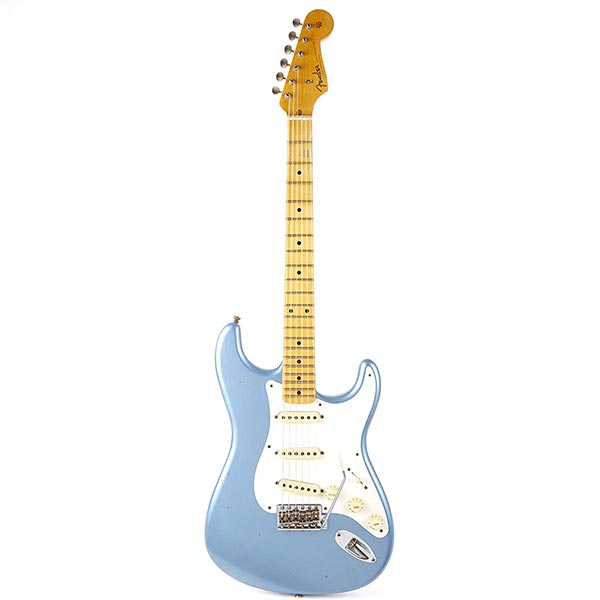
| Estimated Price | $4,500 – $5000 |
| Body Style | Journeyman Stratocaster |
| Top | Roasted Alder |
| Back and Sides | Roasted Alder |
| Neck | ‘60s Style Oval C |
| Fret Count | 22 |
| Pickups | 3 x Mike Lewis Hand-wound ’64 Single Coils |
My Review: When Leo Fender began designing a new solid-body electric guitar with a double-cutaway body design and three single-coil pickups, the world of popular music was about to be turned on its axis.
That was almost seventy years ago, and the Fender Stratocaster remains one of the most iconic and popular guitars in production today. Right off the bat, I could tell that the Custom Shop edition paid homage to the legendary late ’50s and early ‘60s Strats.
After doing some research, I learned that the remarkably realistic aged look of this Strat was due to a process Fender calls their ‘Journeyman Relic treatment. Upon closer inspection, I was amazed at just how real the marks and blemishes on the guitar looked. Sonically and aesthetically, it transports you back to the golden age of rock n’ roll!
Key Specs and Features: The body of the Custom Shop Strat is made from roasted alder. This material is fairly lightweight and ensures that the tone is balanced throughout the bass, mid and treble frequencies.
Roasted flamed maple was used to construct the distinctive Oval C-Shaped neck, which is ideal for combining chords with licks due to its smoothness and rounded shape. Finally, the floating tremolo allows you to bend notes with ease, so if you’re a blues guitarist you’ll love this quality.
Electronics: When checking out the electronic components of the Custom Shop Strat, one thing, in particular, caught my eye. The middle pickup is reverse-wound and reverse-polarity, which interestingly allows you to use the single-coils as humbuckers when the second and fourth switch positions are selected.
The classic warm and jangly tone of the Strat is created by the SSS configuration, with three identical Mike Lewis hand-wound, ’64 pickups installed. When combined with a fuzz pedal, these pickups show their power!
Bottom Line: The Fender Custom Shop Stratocaster includes all of the features that you could need from an electric guitar. There are several advancements included, such as the five-way pickup blade or the blended tone control. Nevertheless, despite the modern qualities of this guitar, its biggest strength is how closely it resembles the Strat’s that were made over 50 years ago.
5. Fender Custom Shop Telecaster
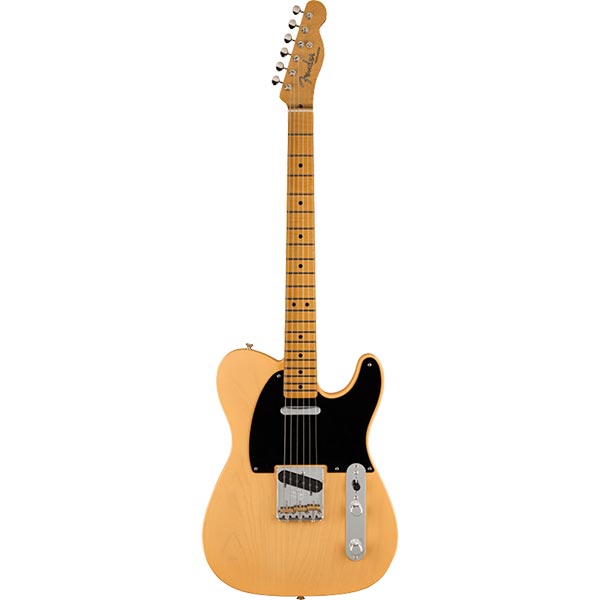
| Estimated Price | $4,000 – $5000 |
| Body Style | American Custom Telecaster |
| Top | Ash |
| Back and Sides | Ash |
| Neck | Large C |
| Fret Count | 22 |
| Pickups | Custom Shop Hand-Wound Open Loaded ’51 Nocaster Single Coil & Loaded Single Coil |
My Review: Like the Stratocaster, Fender’s Telecaster boasts a long and impressive history. Originally used by country guitarists due to its signature ‘twang’ the Tele has gone on to break through the boundaries and transcend musical genres.
When analyzing the Custom Shop Telecaster I instantly noticed the curved heel of its neck. This is a unique design that makes this model stand out amongst the plethora of Tele models Fender has released over the years.
Sonically, the Custom Shop Tele stays true to the warm and jangly tone of its predecessors. Nevertheless, one standout quality I noticed about this particular model was the tight and responsive low-end, which improves its ability to produce crisp-sounding riffs in the bass register of the guitar’s fretboard.
Key Specs and Features: In terms of materials, Fender has opted for the trusted combination of ash and maple for the body and neck respectively. Ash as a body material enhances the twangy, tight sound of the Telecaster’s midrange, while the maple bolt-on neck makes fast transitions effortless.
Telecasters are designed to be roadworthy, and one of the things I love the most about them is that they can take a lot of punishment and arguably get better with age. Fender has installed a bi-flex truss rod, which ensures that the classic robustness is present on this modern Tele.
Electronics: The ’51 Nocaster pickups sound incredible on this Custom Shop Telecaster. In the neck position, Fender has opted for the ‘Open Loaded’ pickup, while the bridge features the standard ‘Loaded’ version.
The combination of these single-coil pickups produces the hot Tele tones that work perfectly for rock, blues, funk, and R & B guitar players. The highs sing the lows sound rubbery and tight, and the midrange twang is as strong as ever thanks to these Fender-designed pickups.
Bottom Line: Whenever a new Telecaster model is announced, I find myself wondering how Fender could improve this iconic instrument. The Custom Shop Tele proves that they can. With all of the classic features that make the Tele ideal for rhythm and lead guitar, plus the finest tonewood blends and powerful, high-end single-coil pickups, this model is stunningly good.
6. EVH Wolfgang USA Edward Van Halen Signature
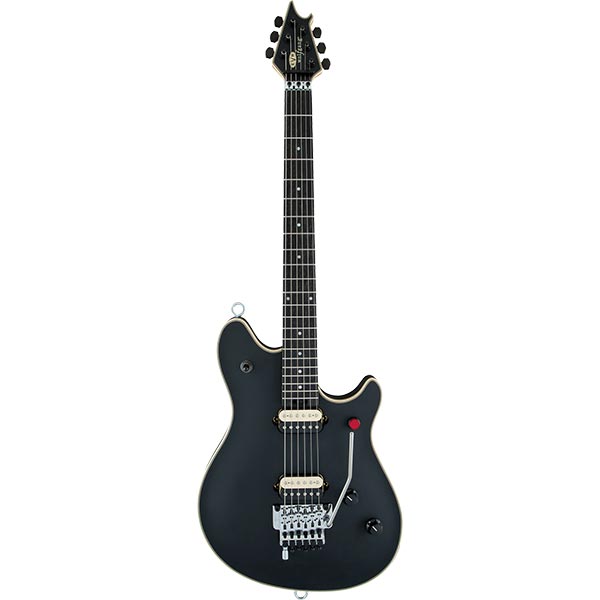
| Estimated Price | $4,600 |
| Body Style | Wolfgang Signature |
| Top | Big Leaf Maple |
| Back and Sides | Basswood |
| Neck | Wolfgang |
| Fret Count | 22 |
| Pickups | Wolfgang Alnico 3 Humbucker & Wolfgang Alnico 2 Humbucker |
My Review: In 2005, legendary guitarist Eddie Van Halen teamed up with Fender to create EVH. The manufacturing company went on to create three solidbody models: the Wolfgang WG Standard, Wolfgang Special, and most notably the flagship Wolfgang USA.
In my experience testing signature guitars, this niche tends to produce a wide range of results – some impressive and some disappointing. However, the USA Edward Van Halen Signature falls into the former category.
I was instantly drawn to this guitar’s sleek matte black appearance, but it was the incredibly smooth playability that captured my attention. Eddie Van Halen once stated that the Wolfgang USA was the product of all of the knowledge he’d gained in 35 years of building guitars, and after experiencing its incredible tone and playing comfort, I believe him!
Key Specs and Features: Taking a closer look at the components of the EVH USA, you will find a luxurious blend of tonewoods. The basswood body ensures tight dynamics, while the big leaf maple top adds sustain to every note.
Van Halen’s playing style involved a lot of fast-paced shredding and note bending. The unique quartersawn neck facilitates this style, as the material is more resistant to warping and helps the guitar to stay in tune. A Floyd Rose tremolo has also been installed to further improve tuning stability.
Electronics: With its HH configuration, the EVH Wolfgang USA produces creamy humbucker tones which respond wonderfully to gain. In the neck position, the pickup utilizes the additional output of an Alnico 3 magnet. The bridge features a slightly weaker Alnico 2 magnet, and when mixed these humbuckers produce a sharp, powerful tone ideal for heavy rock, metal, or blues.
Bottom Line: The EVH Wolfgang USA combines distinguished aesthetics with a wide range of rock-inspired tones. It plays extremely fast and is perfect for Van Halen’s style of playing. Tapping, bending, dive-bombing and shredding are all made easier by the unique design of this solidbody beauty!
7. Gibson Les Paul Custom
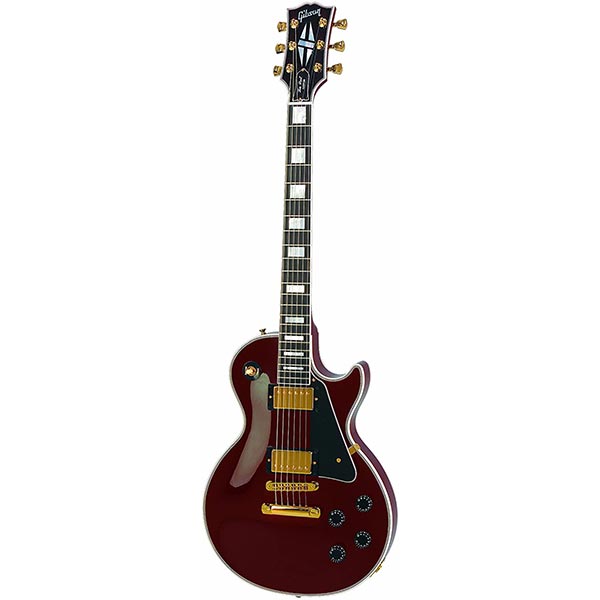
| Estimated Price | $5,000 – $9000 |
| Body Style | Les Paul Custom Solidbody |
| Top | 2-Piece Plain Maple |
| Back and Sides | Mahogany |
| Neck | ’59 Medium C |
| Fret Count | 22 |
| Pickups | 490R Bass Humbucker & 498T Treble Humbucker |
My Review: With a history spanning over six decades, the Les Paul Custom has cemented its legacy as a truly iconic solid-body electric guitar. One of the things I find the most impressive about this Gibson guitar is its undeniable versatility, and how it can be used for almost any musical genre or style of guitar playing.
I was intrigued to discover the tweaks and improvements that Gibson had made when designing this modern edition of the classic Les Paul Custom. When analyzing its appearance, it soon became clear to me that many of the trademarks associated with the vintage Les Paul models had been retained.
The guitar’s nitrocellulose lacquer finish adds an authentic vintage look and feels to this modern classic. After doing some research, I learned that this type of finish isn’t applied solely for cosmetic reasons – it also enhances the sonic qualities of the Les Paul Custom, notably its sustain. I was very impressed by the length of time chords could be rung out when playing rhythm parts on this guitar.
If you are a fast-fingered technical guitarist, the Les Paul Custom facilitates this style of playing better than most guitars on the market. It blends effortless playability with tonal attitude and power, resulting in an instrument that can be used for hard rock, metal, blues, funk, and more.
Key Specs and Features: First of all, the Les Paul Custom has the classic body shape that was used by Gibson when producing late 1950’s models.
Mahogany is used for the body and neck of the guitar, which ensures a sweet tone and also facilitates seamless transitions across the fretboard. I’m a huge fan of ebony as a fingerboard material, as it is extremely forgiving and smooth to touch.
As you’d expect from a top-of-the-range Gibson guitar, the hardware and finer details are of the highest quality. The stop bar tailpiece which is combined with a tune-o-matic bridge ensures that the guitar’s intonation and tuning are both resilient and consistent.
Electronics: Both of the pickups installed on the Les Paul Custom are designed by Gibson. In the neck position, you will find a 490R Bass Humbucker, and in the bridge position, there is a 498T Treble Humbucker.
These pickups are essentially modern revamps of the ones that were installed in the ’57 Les Paul Classic. They combine to produce a warm, colorful tone, with brilliant note separation and articulation. There’s also the classic two-way pickup selector installed on the guitar’s body for switching between the neck and bridge sounds.
Bottom Line: Right off the bat, I could tell that a lot of time, thought and consideration has gone into this new edition of the Les Paul Custom. This guitar has built such a loyal and substantial fanbase over the years, that making any adjustments to it must be a very daunting undertaking.
After taking the time to thoroughly analyze the Les Paul Custom, I can safely say that Gibson has managed to stay true to all of the classic qualities and features of the original, whilst improving certain attributes such as note sustain and tonal versatility. This is one of the most expensive production guitars out there, but it’s well worth the money.
8. Gretsch G6134T-58 Vintage Select Edition ’58 Penguin
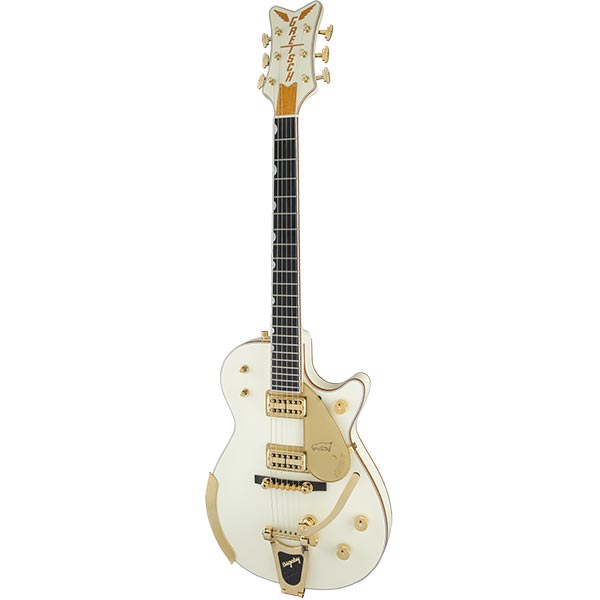
| Estimated Price | $3,700 |
| Body Style | Penguin |
| Top | Arched Laminated Maple |
| Back and Sides | Chambered Mahogany |
| Neck | Standard U-profile |
| Fret Count | 22 |
| Pickups | 2 x TV Jones Classic Filter’Tron Dual-coil Humbuckers |
My Review: With a history stretching back to the late 19th century, Gretsch has been prolific in its production of guitars, drums, and other instruments. Their electric guitars have a unique, vintage appearance, and have been used by many iconic musicians including George Harrison, Neil Young, Jack White, and Johnny Marr.
The original ’58 Penguin was Gretsch’s competitor to the popular solidbody guitars of the era, notably the Gibson Les Paul and Fender’s Telecaster and Stratocaster. At first glance, this remake could easily be mistaken for the original. It was designed meticulously to resemble the 1958 version both aesthetically and sonically.
One aspect of the G6134T-58 that I was highly impressed by is the thickness of its tone. I found the midrange to be warm and fat-sounding but surprisingly detailed with clear note separation.
I also found this solidbody guitar to be extremely comfortable to play. It’s got the substantial weight of a Les Paul, and the gold-plated armrest allows your hand and lower arm to sit in the ideal position to promote dexterity and preserve stamina when strumming or picking.
Key Specs and Features: I’ve encountered many convincing remakes of classic guitars in the past, but this Gretsch ’58 Penguin reissue raises the bar. I’m a huge fan of the Space Control bridge, which looks the part but also improves tuning stability and intonation.
Many features add up to make this guitar extremely playable. The chambered mahogany body combined with an arched laminated maple top extracts every last bit of resonance from the strings, while the 22 medium-jumbo ebony frets allow ample room for expressive fretting techniques and chord shapes.
Electronics: Installed on the G6134T-58 are two identical TV Jones Dual-Coil humbuckers. These pickups produce a fat, full-bodied tone, with plenty of character in the midrange and clarity in the higher frequencies.
Bottom Line: The G6134T-58 Vintage Select Edition ’58 Penguin embodies everything that makes Gretsch guitars so special. It oozes authentic vintage qualities, in terms of both appearance, feels, and sound. For classic rock n’ roll guitar tones and smooth playability, this guitar is a great choice.
9. Fender American Professional II Stratocaster
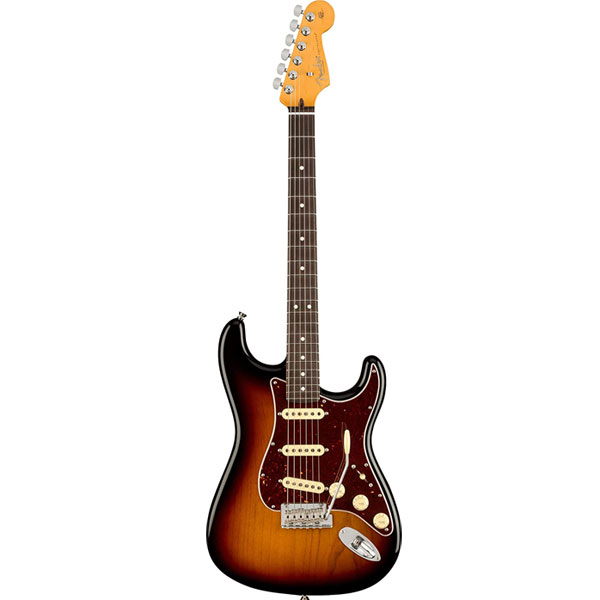
| Estimated Price | $1700 |
| Body Style | Double Cutaway Solid Body |
| Top | Alder |
| Back and Sides | Alder and Ash |
| Neck | Maple |
| Fret Count | 22 |
| Pickups | V-Mod Single Coil Stratocaster |
My Review: When talking about electric guitars, we can’t forget about Stratocasters. There are so many different high-end Stratocasters in the market from vintage Strats to modern versions of the Stratocaster. But in this review, we are going to look at the Fender American Professional Stratocaster.
Fender has been constantly putting out new and “improved” versions of the Strat, and the Fender Professional Stratocaster is one of the newest versions of the Stratocaster.
As the name suggests, this model was put out as a versatile guitar for professional guitarists and musicians alike. It was designed to incorporate the best of the old and the new, and has some new technologies that the young guitarists will love.
Because of the new technologies and modern features, the Professional Stratocaster will serve as the ultimate musical tool for playing and creating diverse musical styles from blues to EDM and everything in between.
Key Specs and Features: First looking at the Strat body, it still has the classic Fender Stratocaster body that we all know and love. The body is composed of Alder and Ash on Sienna Sunburst, and the neck is a Maple neck. The neck profile is upgraded from the previous American Standard Stratocaster models, and it features a modern deep “C” neck profile.
Although the difference isn’t huge, the back of the neck is deeper than the previous C neck profile, and the shoulders are a little bit wider as well. The deeper neck profile makes the body feel slightly bigger and more full, and this stiffens up the neck. And this leads to slightly more sustain in the guitar tone and having more depth in the tone.
Some other additions include the bridge design, which features 2-point Synchronized Tremolo with Bent Steel Saddles and Pop-in Tremolo Arm. With the previous tremolo arm in the older version, you had to literally screw in the arm every time you put it in and take it out.
But the new Pop-in Tremolo Arm allows you to simply push in the arm and the arm easily locks into place. Even though this might be a big difference, it certainly is more user-friendly than the traditional way of putting in the arm.
Electronics: In terms of the pickups on the Professional Stratocaster, there are certainly some big changes. The new pickups on the Professional Stratocaster are called the V-Mod Single Coil Strat, which are designed by Tim Shaw.
The V-Mod Single Coils were invented by Tim experimenting with various Alnico magnet types, and it basically uses Alnico II, Alnico III, and Alnico V magnet types and various combinations of the three types. Each position of the 5-way selector uses a certain combination of three Alnico magnet types and you can really amplify the personality of each position.
The control circuit is also slightly tweaked and the new treble-bleed tone circuit really lets your tone shine through the amplifier. This tweaked tone circuit allows you to retain the high-end even when you turn the volume knob down.
This changed pickup system and tweaked control circuit might not suit the vintage Fender lovers, but for young guitarists who want to play the modern musical styles, this guitar is perfect.
Bottom Line: All in all, the Fender American Professional Stratocaster is certainly a modern take of the timeless classic. It feels different from the vintage Strats and sounds different from the vintage Strats as well.
But with all these new technologies implemented, the Professional Stratocaster can certainly be used for more modern genres like modern pop & rock and even EDM. Overall, it’s a great high-end electric guitar for maximum versatility.
Popular Related Article: List of our Favorite Guitars Made in the USA
10. Fender American Professional II Telecaster
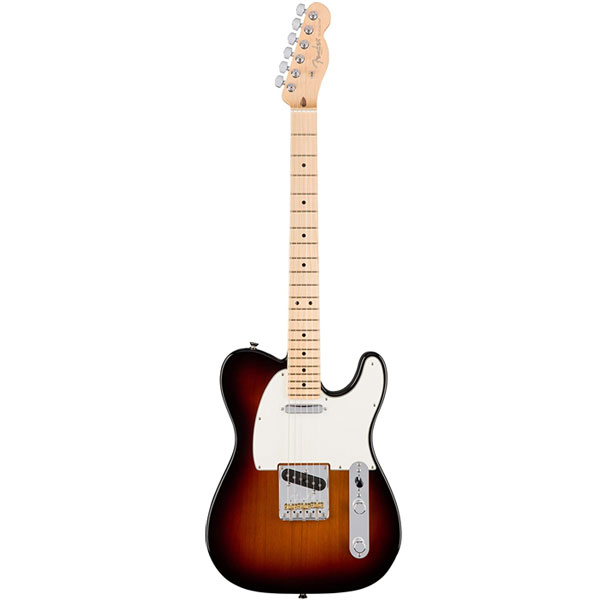
| Estimated Price | $1700 |
| Body Style | Single Cutaway |
| Top | Alder |
| Back and Sides | Alder and Ash |
| Neck | Maple |
| Fret Count | 22 |
| Pickups | V-Mod Single-Coil Telecaster |
My Review: Another iconic guitar that we have to talk about is the Fender Telecaster. Telecasters are actually older than Stratocasters, and there are so many top-quality vintage Telecasters that are available in the market.
Although there are many great high-end options for the Telecaster, we are going to look at one of the most commercial options for the Telecaster. The Fender American Professional Telecaster came out in 2017, and Fender’s Professional Series was meant to be a modern upgrade to the already-popular Fender Standard series.
The Telecasters are very different creatures compared to the Stratocasters, and the tone palette is much different.
They are also very versatile, but the tones generally have more “twang” and punch compared to the Stratocasters. In a way, the Telecasters can be seen as more primitive than the Stratocasters, but there is certainly beauty in simplicity and authentic vintage tone.
Key Specs and Features: It shares many similarities to the Fender Professional Stratocaster, and the body is made up of Ash and Alder and the neck is a deep-C maple neck. Like I mentioned above, the deep-C neck profile provides a deeper and slightly thicker neck.
This gives the players a more vintage-guitar feel, and therefore you can get a thicker tone out of it as well. Other features include 3-saddle vintage style bridge and Fender Deluxe staggered tuning machines. The hardware is an odd-to-the classic Telecaster, while many other features are new technology. Overall, this guitar has a good mix of both old and the new.
Electronics: This guitar comes with the all-new V-Mod Telecaster single coils, designed by the master Tim Shaw. The V-mod Telecaster is a mix of both alnico V and Alnico II, and the Telecaster pickups are positioned inversely from Strat’s middle pickup.
Tim Shaw specifically designed the V-Mod Telecaster to have the classic biting Telecaster, but not too bright that it’s ear-piercingly thin. Overall, the V-mod Telecaster really lets the guitar sing and both neck and bridge pickup positions have distinct colors to them.
Bottom Line: Fender continues to deliver an all-new high-quality line of Telecasters, and the American Professional Telecaster is the perfect guitar for modern guitarists that are into rock, blues, country, pop, and even surf.
11. Gibson Les Paul Standard
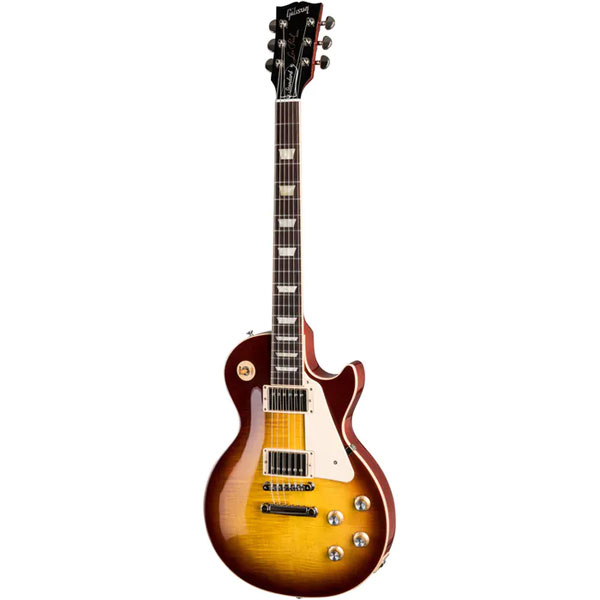
| Estimated Price | $2700 |
| Body Style | Single Cutaway |
| Top | AA Figured Maple |
| Back and Sides | Mahogany |
| Neck | Mahogany |
| Fret Count | 22 |
| Pickups | BurstBucker 61R and BurstBucker 61T |
My Review: Gibson Les Paul is another classic high-end electric guitar that we can’t forget about, and on this list, we are going to look at the Gibson Les Paul Standard 60s. The Les Paul Standard 60s is a replica of the best Les Pauls from the 1960s, and still retains most of the classic features that made this guitar special in the first place.
After playing the guitar, the Gibson Les Paul Standard 60s responded beautifully to my picking and fingerpicking, and the guitar really sang. The grip and left hand feels super comfortable all around the neck, and it has a really good resonance despite the small body size.
Although many recognize this guitar as a rock or blues guitar, the Gibson Les Paul is much more versatile than people might think. It can also be perfect for playing jazz or clean tones as well. Overall, it’s a timeless masterpiece that will be here to stay for many years to come.
Key Specs and Features: Following the Gibson tradition, this Les Paul has an all-mahogany body with AA figured maple top. The all-mahogany construction is something that is almost a part of Gibson Les Pauls, and it’s one of the main ingredients that make Les Pauls what they are.
It gives the guitar that mahogany tone, and it’s something that can’t be replicated with any other choice of wood. The mahogany neck with SlimTaper neck profile gives you that vintage feel, and it’s extremely comfortable to press onto the strings.
In terms of hardware, it keeps the same reliable hardware as the original model back in the 1960s. It features ABR-1 tune-o-matic bridge with stopbar tailpiece, as well as Grover Rotomatic Tuners for the tuning. The guitar is also super versatile, and you can play everything from jazz, rock, blues, and pop.
Electronics: Gibson Les Paul Standard uses Burstbucker 61R pickup for the neck and Burstbucker 61T pickup for the bridge. All the Gibson Burstbucker pickups are great, but the 61R and 61T provide a very gritty, and full tone.
They do push the amp a little bit more than the standard Burstbucker pickups, and they are also great for playing lead guitar as well as rhythm guitar with the volume rolled down. The pickup positions are controllable with the classic 3-way pickup switch.
Bottom Line: Gibson Les Paul Standard 60s is an excellent high-end guitar for players that love the vintage sound and it’s perfect for playing with overdrive guitar tones and tube amps. It’s also highly recommended to guitarists that are into rock and blues genres.
12. Gibson ES-335
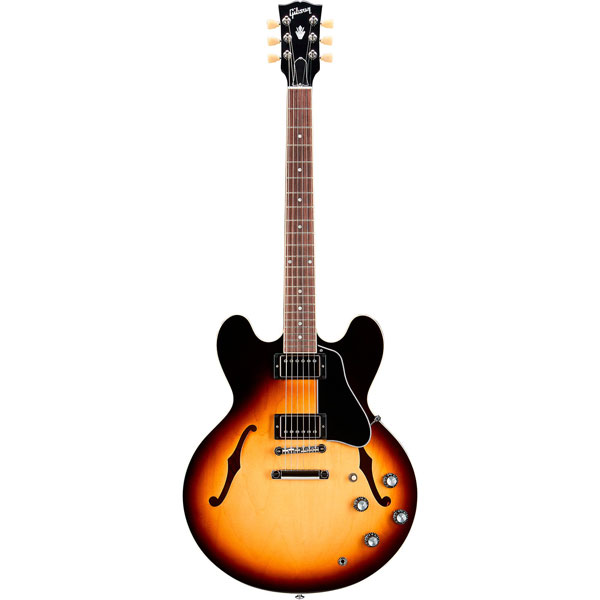
| Estimated Price | $3300 |
| Body Style | Double Cutaway Semi-hollow Body |
| Top | 3-piece Maple/Poplar/Maple |
| Back and Sides | 3-piece Maple/Poplar/Maple |
| Neck | Mahogany |
| Fret Count | 22 |
| Pickups | Dual Calibrated T-type humbuckers |
My Review: To start off this list, we look at one of the most well-known guitars that is an undeniable classic of classics in the electric guitar world. You’ve seen the guitar in the hands of legends like BB King or Larry Carlton, or even in the movies like Back To The Future.
The version of Gibson ES-335 was first released in 1958, and it was the first of its kind – a thinline semi-hollow body guitar.
Ted McCarty invented this guitar to combine both solid body and hollow body guitar, and with this guitar, you could play both jazz and blues – getting that fat jazz tone and also get a beautiful blues guitar tone. There is an obvious reason why this particular model has dominated the semi hollow guitar market for over 60 years now.
Its timeless beauty and tone with the best of the best hardware and craftsmanship still sets a very high standard for high-end semi-hollow electric guitars.
Key Specs and Features: We can see that this guitar has a solid block right on the center of the guitar body, and this allows me to get a solid body guitar tone but also getting that deep resonance from the vibration. The body shape is the best double cutaway Gibson guitar shape, and it is composed of 3-piece maple/poplar/maple wood for both the top and back & sides.
The neck is made up of a mahogany neck and the neck profile is rounded C-shape. The neck profile remains the same after all those years, and we can tell you from experience that it’s a thick neck profile that gives you a nice comfortable grip.
Now it might take a little getting-used-to for young guitar players who are used to modern, thin guitar neck. But there’s really no better neck profile for getting that thick and fat blues and jazz tone than a fat C-shaped neck.
Much of the hardware still remains the same. The Gibson ES-335 features Gibson Vintage Deluxe tuners with keystone buttons, which provides super reliable tuning stability and precise intonation. The hardware is so solid that even after 20+ years, you’ll still be able to get a solid tuning and accurate intonation.
Another reliable hardware is the Gibson ABR-1 bridge and stop bar tailpiece. This bridge combination almost became the hallmark of Gibson guitars and it served as the standard for many high-end electric guitars.
Electronics: In terms of pickups, the modern Gibson ES-335 comes with Gibson calibrated T-type humbucking pickups. These are reliable humbuckers from Gibson and you can expect to get a great tone for many different genres such as jazz, blues, rock, country, and RnB.
The guitar has a three-way pickup selector with two volume knobs and two tone knobs for neck and bridge pickups. Now the general tone from this guitar will be on the warm side and will have plenty of mid to cut through the band mix. But with some overdrive and maybe even some distortion, you can get a gorgeous blues and rock tone as well.
By going to the bridge pickup, you can have a more powerful rock/distortion tone as well. Overall, it’s a much more versatile instrument than many people think.
Bottom Line: Overall, the Gibson ES-335 is hands-down one of the best high-end semi-hollow electric guitars around, and it sets a very high standard for semi-hollow guitars. It’s very versatile and a great thing about the ES-335 is that with time, the guitar will age like a fine wine. For any serious blues guitarist, the Gibson ES-335 is one of the must-have guitars in your arsenal.
13. PRS McCarty 594
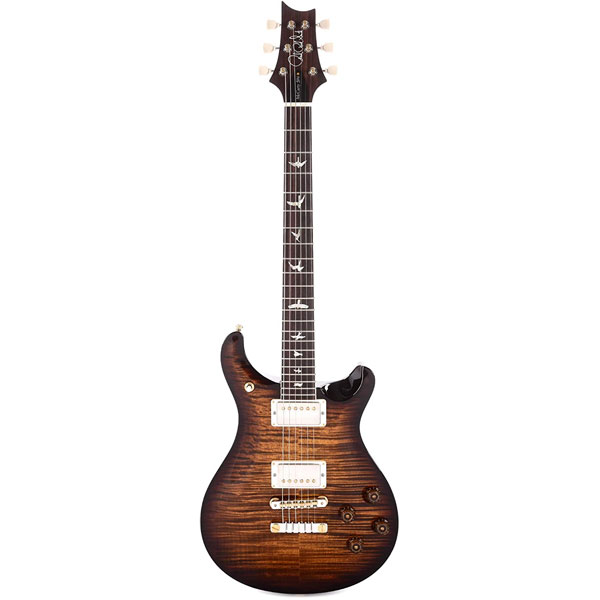
| Estimated Price | $4000-$5000 |
| Body Style | Double Cutaway Solid Body |
| Top | Curly Maple |
| Back and Sides | African Mahogany |
| Neck | Mahogany (Pattern Vintage) |
| Fret Count | 22 |
| Pickups | PRS 85/15 Bass and 85/15 Treble Humbucker Pickup |
My Review: Next up, we have a special electric guitar that was meant to encapsulate all of the best bits of legendary vintage electric guitars. The PRS McCarty 594 is a real masterpiece that was originally dedicated to the legendary figure in the guitar industry – Ted McCarty.
Ted McCarty served as the president of Gibson between 1950 and 1966, and he was responsible for innovations like Gibson’s Flying V and SG models. After being responsible for many groundbreaking inventions in the guitar industry, he was a crucial figure that helped Paul Reed Smith develop into the PRS that we know today.
Because of his key contribution to the company and Paul’s special relationship with Ted McCarty, Paul decided to make their most high-end guitar dedicated to Ted McCarty. The PRS McCarty line features their most high-end guitars, and among them, the McCarty 594 stands out the most.
It’s the most luxurious, well-built, almost-perfect guitar that PRS makes, and the 594 stands for 24.594’’ scale length. 24.594’’ scale length served as the standard scale length for Gibson’s guitars in the 1950s. In many ways, this guitar was inspired by what Paul thinks of as one of the best vintage guitars – the 1959 Gibson Les Paul.
That model served as the basis for this model, and PRS infused many of the best modern guitar technology, along with their signature PRS features like their headstock and body shape.
The thought process behind this guitar is that rather than spending thousands of dollars on a pre-existing vintage guitar, you can purchase a brand new guitar at about the same price as a high-quality vintage guitar but with modern technologies. The guitar was designed by PRS’s elite Private Stock team to celebrate the 20th Anniversary of the Private Stock Programme.
Key Specs and Features: On the PRS McCarty 594, we can see that it still maintains many of the PRS qualities that we can also find on other PRS guitars. First off, the McCarty 594 has the usual PRS double cutaway solid body with African Mahogany as their main ingredient for the guitar body.
For the top, PRS used Curly Maple wood, and the neck is made up of mahogany. Another PRS feature we can find is the PRS designed tremolo bar with PRS Phase III Locking tuning machines. The tremolo bar and PRS Phase III Locking tuning machines give us great reliability for playing the guitar.
Now moving on to the new features, the McCarty 594 has a rather unusual scale length of 24.594 inches. This was an effort by Paul Reed Smith to recreate the tone of the legendary 1959 Gibson Les Paul and Paul found the sweet spot for getting that vintage Gibson sound.
The neck profile is new as well, and this particular guitar has the new PRS Pattern Vintage neck carve. The neck profile is similar to the PRS’s Pattern neck, but it’s slighter thicker from front to back, and has an asymmetrical curve that is deeper on the lower part of the neck.
This kind of neck suits the guitar players who are used to playing a thick vintage guitar neck, but the new asymmetrical shape will also make the transition easier for guitar players who are used to modern thin necks.
Electronics: The pickups on this guitar are PRS 58/15 LT pickups, and the LT stands for Low Turns. The LT feature gives the pickups a much sweeter lower output tone. Something that is unusual about this guitar is that the 58/15 LT pickup is used for both bridge and treble pickup.
For a high-end humbucker-based guitar like this one, it’s not very often that we see the same pickup being used for both bridge and treble side. But the important thing is that tone for both bridge and treble pickup is superb and the quality will blow you away.
The tone might remind you of the ‘59 Les Paul sound, but at the same time, it’s a more modern sound that can be used for various kinds of genres. The clarity and sensitivity of the pickups are also mind-blowing and the versatility of these pickups are unmatched.
Following the Gibson tradition, the McCarty 594 has a three-way pickup switch and 2 volume + 2 push/pull tone controls. The pickup switch and the controls are thoughtfully placed at the most easily accessible places of the guitar and the top quality coil-split feature on the tone knobs will give you so many different tones for you to work with.
Bottom Line: PRS McCarty 594 is hands down one of the best electric guitars out there. With this guitar, you can play everything from blues, rock, funk, RnB, jazz to pop – the sky’s the limit. McCarty 594 is truly a PRS masterpiece that encapsulates the best of both vintage and modern. It’s one of the most expensive production guitars you can buy and also one of the highest quality.
This guitar is highly recommended to anyone that can afford the $4000+ price point. It’s a top choice for professional top-level recording, and live performing.
Popular Related Article: Top Quality Guitars Made In America
14. PRS John Mayer Silver Sky
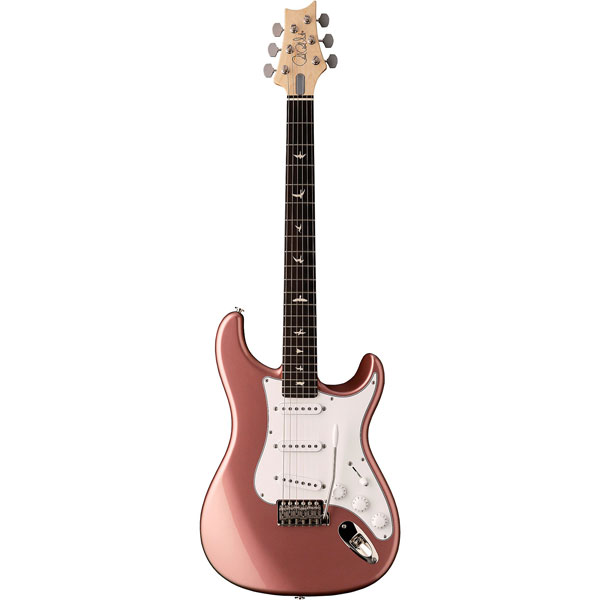
| Estimated Price | $2600 |
| Body Style | Double Cutaway Solid Body |
| Top | Alder |
| Neck | Maple |
| Fret Count | 22 |
| Pickups | 635JM Single Coil Pickups |
My Review: We’ve seen a model of the iconic Fender Stratocaster above, but now let’s take a look at a modern interpretation of Fender Strat by none other than PRS. Now as we all know, there are literally thousands of copies and interpretations of Stratocaster all around the world.
But what sets this model apart from others, is that this one was designed by PRS in collaboration with guitarist John Mayer. John Mayer surely knows a thing or two about Strats, as he is an expert on them and has been playing all kinds of Strats for a long time, from vintage to boutique modern models of Strats.
The duo took almost two and a half years to finish this project and when it was released, the reaction from the consumers was mixed. Some thought it was just another version of Strat, and some thought it was a very special Stratocaster.
But over time, people have realized that the John Mayer Silver Sky is very unique and certainly one of the best modern takes of the classic Stratocaster.
John Mayer and Paul Reed Smith paid very close attention to all the small details on this guitar, from the headstock down to the bridge. It was largely inspired by the 1963-1964 vintage Fender Strat, a vintage guitar that they both think is the “perfect” vintage Stratocaster. They tried to recreate their favorite features from that model but also incorporated many of PRS’s signature features and technology into the model.
Key Specs and Features: Looking at the body of Silver Sky, the PRS Silver Sky has a Fender Stratocaster body but you might notice something is a little different. The first thing you might notice is that the treble side of the body isn’t as deep as the original Stratocaster while the bass side of the body is deeper and has a sharper nose than the original.
This body shape might throw off the hardcore Strat fans, but compared to the traditional Strat shape, it’s a lot more modern-looking for sure. The body material is Alder and has a Gloss finish and the neck is a bolt-on Maple neck and it has a classic Strat scale length of 25.5 inches.
Something that is very unusual is obviously the headstock of this Strat and it has a modified PRS headstock that John Mayer altered to fit his playing style. As for myself, it took a while for me to get used to the combination of PRS headstock on a Fender Strat body, but now I find it strangely attractive and luxurious.
Another one of the gorgeous things about this guitar is the playing feel and the neck profile. The neck profile is based on the 1963-4 Strat and when I picked up the guitar, it instantly felt comfortable in my hands and I could really dig into the notes with ease.
The guitar comes with numerous other features like the PRS Tremolo Bar and Gen III Knife-edge screws. The bridge also only goes down in pitch and this results in a guitar that is acoustically louder. Other features include a bone nut and molded metal jack plate that makes plugging in much easier.
Electronics: The pickups themselves are 635JM Single Coil pickups, which are John Mayer’s Signature PRS Single Coil pickups. These pickups showcase a full and round tone and have a musical high that will pop out of the mix but is incredibly pleasant to the ear.
PRS Silversky comes with a 5-way blade switch as any Strat would. In terms of tone, all five pickup positions have a distinct sound – neck pickup has a beautiful full sound with a bunch of low end and the bridge has just enough “honk” with plenty of bite to them.
The middle, 2nd, and 4th all have their distinct color and present so much tone variety within the guitar.
Bottom Line: The bottom line is that the PRS John Mayer Silver Sky is not just another boutique modern Strat. With this guitar, the strat is reborn, and it really showcases the best of the old and the new.
This guitar is a final product of years of collaboration between two great minds of the guitar industry and from the playing feel, sound, to looks, Silver Sky is definitely worth the price. This guitar is great for everyone from professional guitarists to intermediate guitarists.
15. Gibson SG Standard ‘61
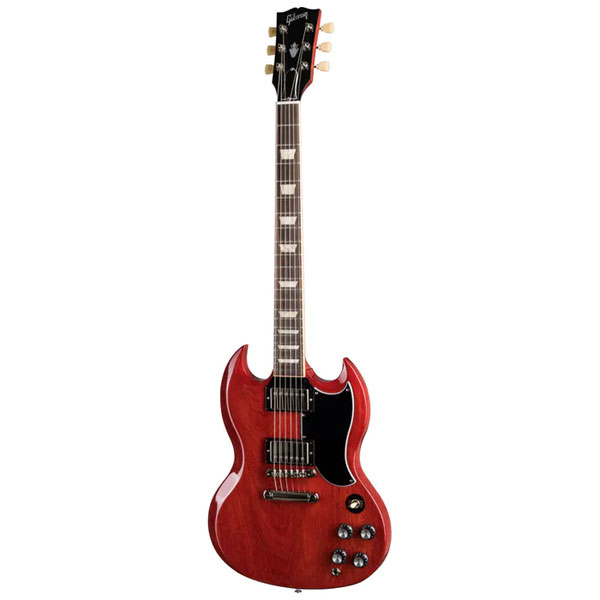
| Estimated Price | $2000 |
| Body Style | Double Cutaway |
| Top | Mahogany |
| Back and Sides | Mahogany |
| Neck | Mahogany |
| Fret Count | 22 |
| Pickups | BurstBucker 61R and BurstBucker 61T |
My Review: Whether it’s from the hands of Derek Trucks or Angus Young, you probably have seen this guitar a whole lot. Launched in 1961, the Gibson SG model is short for “solid guitar”, and it was one of the first guitars that were released after Gibson ended the contract with Les Paul.
They were descendants of the Gibson Les Paul, created after Gibson was experimenting with smaller versions of the Les Paul guitar – Les Paul Junior, TV and Special models. They soon made a thinner, double-cutaway version of those guitars, and a few years later, that guitar became the Gibson SG.
It was only after 1963 where that model officially became the Gibson SG, after Les Paul’s endorsement contract ended in 1962 with Gibson. This was a way for Gibson to respond to their competitors Fender and Gretsch, and especially Fender was launching instant hits after hits with their new models.
But for Gibson, it took them years to really master their SG model, and one of the final pieces was the ABR-1 (tune-o-matic bridge) and PAF (pickups). After the 1960s, and 1970s, the Gibson SG became their most popular model, and the SG soon became an iconic solid-body guitar of the 20th century.
Key Specs and Features: The shocking thing about a good SG is how much sound it produces from such a small body. When on full blast, it resonates super well and creates such a deep overdrive and distortion tone. SG has its own personality to it, you’ll know what I mean if you listen to Angus Young’s playing.
Gibson’s mahogany construction adds a touch of brightness and provides plenty of sustain. Another shocking thing about Gibson is its tonal variety and genre diversity. From Sister Rosetta Tharpe to Spinal Tap Nigel Tufnel to Derek Trucks, this thing nails so many different styles.
Now that we’re almost coming to the end of this review, let’s take a look at some electric guitars that are the highest of the highest quality. We introduced a cheap Epiphone version of the Gibson SG, but here is the original SG made by the Gibson.
Bottom Line: Like the guitars above, the Gibson SG Standard ‘61 is an effort to go back to the original model, and use what worked best but also make minor new modifications. They are available in three different versions, with Maestro Vibrola, with Sideways Vibrola, and with just the tune-o-matic bridge.
You can think of these as the sound of the ’60s, and they feature Burstbucker ‘61 R and T pickups – meaning rhythm for the neck pickup, and treble for the bridge pickup. These babies have the Alnico 5 magnets, and it allows little more output and bite, and cuts through the sound more than the alnico 2 magnets.
The volume and tone controls are hand soldered CTS 500k audio taper pots. Unlike some of the new guitars where the controls aren’t as sensitive, these will allow you to control the volume and tone to the smallest detail. Standard ‘61 features a full mahogany body and SlimTaper neck, and rosewood fretboard with Plek’d frets.
They are available in vintage cherry, which is the classic SG color that we all grew up with! If you’re looking for a lightweight guitar that has a huge sound, and that’s perfect for rock and blues, Gibson SG Standard ‘61 is what you’re looking for! While it’s not the most expensive electric guitar on this list, it’s still a great choice!
Popular Related Article: High-End Acoustic Guitars You Need To See
16. PRS Tremonti
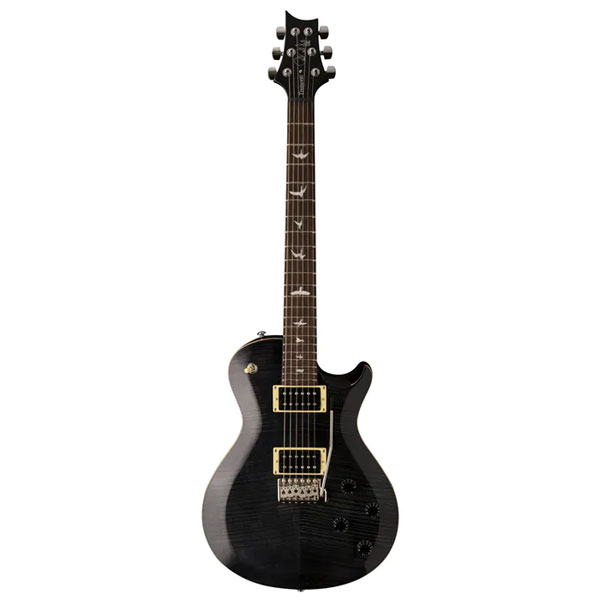
| Estimated Price | $4000 – $5000 |
| Body Style | Single Cutaway |
| Top | Carved Figured Maple |
| Back and Sides | Mahogany |
| Neck | Mahogany |
| Fret Count | 22 |
| Pickups | PRS Tremonti Pickups |
My Review: PRS is also known for their extremely well-made and unique signature models that stand out among many other signature models from other brands. They work with some of the most well-known guitarists of our lifetime, and the artists they work with expands over many different musical genres.
PRS is also prominent in the rock music industry, and one of their best-selling signature models is the PRS Tremonti, a signature model of Mark Tremonti of Alter Bridge and Creed.
The relationship between Mark Tremonti and PRS started when he was offered to try out the PRS McCarty model while he was out on tour. Mark immediately fell in love with the guitar and wanted to have a model that was more suited to his specific style.
After a long process of collaboration, the PRS Tremonti model was born. It’s aggressive and powerful, and for rock guitarists that were looking into a PRS guitar, PRS Tremonti will be able to satisfy your needs and give you the rock sound you’ve always wanted.
Key Specs and Features: The PRS Tremonti has quite a different look from the standard PRS guitars. First off, you will notice that the guitar has a single-cutaway body shape instead of double cutaway. The body shape and the finish are very luxurious and the body material is all mahogany.
The single-cutaway shape is designed to give the players maximum fretboard access all the way up to the 22nd fret and the body shape is designed for maximum comfort. The fretboard is rosewood and the scale length is 25 inches. Some things that are kept the same are the masterfully built PRS Gen III Tremolo and PRS Phase III Locking Tuners.
The tuners and the bridge keep the tuning of the guitar dead accurate and the Gen III Tremolo allows you to bend notes both up and down. The tremolo bar is very sensitive and controlling is very smooth. It’s perfect for doing wild vibratos and bends using the tremolo bar.
In terms of the neck profile, Mark Tremonti wanted a thin neck for maximum shredding and bending access. So the PRS Tremonti has the Pattern Thin neck with Gloss neck finish. It’s absolutely effortless to move up and down the neck, and you can shred and bend easily. For metal guitarists and hard rock guitarists, this kind of neck profile will be perfect.
Electronics: The electronics on this guitar are also quite different from the standard PRS models. In terms of controls, the PRS Tremonti has two volume knobs and two-tone knobs for both neck and bridge pickups. On the treble side of the body, there is a 3-way pickup switch.
But the main difference is the pickups on this model. PRS Tremonti comes with signature Tremonti bass and treble pickups – you can think of these as high-gain, high-output versions of preexisting PRS pickups. These pickups can pack some serious punch and even with a clean tone, you can get a gritty breakup sound when you dig into the strings.
When paired with some overdrive and distortion pedals, you can easily get a powerful metal and hard rock guitar tone. The neck pickup is great for heavy palm muting and rhythm guitar playing and the bridge pickup can be used for wild rock and blues guitar solos.
Bottom Line: If we’re talking about the best high-end rock guitars, PRS Tremonti will surely be one of my best picks. Not only is it visually gorgeous, but the PRS Tremonti also packs such a powerful sound that is perfect for rock guitarists. From its neck profile to the bridge, the design is meant for rock guitarists.
If you love how this guitar sounds and looks but it’s way out of your budget, there is an affordable version called the PRS SE Tremonti as well.
17. Ernie Ball Music Man John Petrucci Majesty
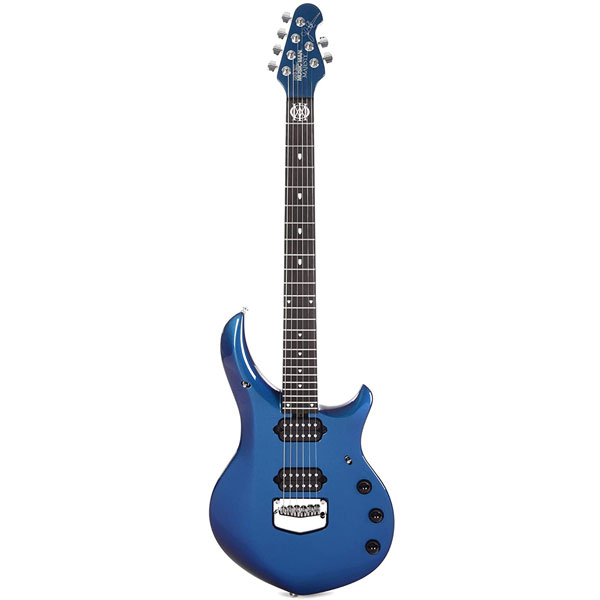
| Estimated Price | $3700-$5800 |
| Body Style | Double Cutaway |
| Top | Mahogany |
| Back and Sides | Mahogany |
| Neck | Mahogany |
| Fret Count | 24 |
| Pickups | DiMarzio Sonic Ecstasy |
My Review: Music Man was founded in 1974, and they were first known as a company that introduced active electronics on their production lines. The famous music accessories entrepreneur Ernie Ball’s son Sterling Ball – who is a legendary instrument designer and a musician by his own right – was on the team since the 1970s.
He helped develop the famous StringRay Basses, and Ernie Ball company officially bought Music Man in 1984. In 2001, they teamed up with John Petrucci, one of the all-time great metal guitarists, and launched John’s first signature model: The JP6.
Ever since then, John Petrucci and the team at Music Man never stopped innovating and developing and created a total of 9 signature John Petrucci signature guitars. The amazing thing about his signature lines is that John personally always uses his signature guitars in his Dream Theater tours, recordings, and songwriting process.
This is quite rare in the guitar world because many guitarists with their signature line will use multiple different guitars when they are actually playing on stage. But John exclusively uses his signature models, and over time, he was able to gather all kinds of feedback, make adjustments, and do experiments to create the best possible instrument.
With over 18 years of experimenting and developing multiple signature models, the one and only Majesty were born. It’s the pinnacle of all his creations and his Majesty is simply put, one of the best signature guitars you’ll find anywhere. If you’re looking for the maximum performance, high-end guitar, the Music Man Majesty is certainly the guitar for you.
Key Specs and Features: The design of the Majesty is said to be inspired by sports cars and running stallions, and it’s pretty obvious when you look at these. As the name suggests, it’s really a majestic looking instrument, and it also comes in multiple beautiful colors – Blue Hanu, Dark Roast, Enchanted Forest, Red Sunrise, Solar Dust, Stealth Black, and Tiger Eye.
And the really cool thing about it is that different color models have slightly different features to them. For colors like Enchanted Forest, it has a mahogany neck and maple top and has matte black hardware. For two colors, like the Kinetic Blue, the color changes depending on where the light hits the surface. So for those models, the body is composed of basswood and has chrome hardware.
The Tiger Eye color is a separate limited edition model with completely different body composition. So even amongst the same model, there are slightly different aspects to it, and these aspects will all result in slightly different tones. The pickups are designed by John Petrucci – his new Rainmaker and Dreamcatcher humbuckers.
These are very powerful machines by themselves, and these are the culmination of John’s work over many years and his constant development for the best pickup that would suit his guitar. He says these humbuckers bring out the Majesty’s inherent tonal complexities “in a way that gives the guitar an expressive, intense, fearless, creamy, gorgeous, pure, unobstructed, and addictively powerful voice.”
Although the Rainmaker and Dreamcatcher humbuckers can work well with any amps, John Petrucci’s preference of amp pairing is a Mesa Boogie or other high gain 6L6 amps.
All Majesty guitars have 24 frets, and the neck is long and it’s not blocked by the body, so you can access all 24 frets on both sides of the guitar. It really incorporates all the best sounds from all JP’s previous signature models and John Petrucci describes this guitar as a “really bold, present, up-front, sustaining personality”.
The volume knob has a switch, and you can access the 20db boost feature. The tone knob has a coil tap button feature. On top of that, there is something called the Piezo function. And what this does is when the switch is set to Piezo, you can access super high-quality acoustic steel-string guitar sound.
Naturally, it’s not a perfect acoustic guitar sound, but it has a seductive quality on its own. In terms of live performance, it can work beautifully, and unlike an actual acoustic guitar, you can mix and match any effects on it without worrying about possible feedback problems from the amp.
It’s a really futuristic feature and you can even combine the Piezo pickup + the regular magnetic pickup. They all have a mahogany neck-through design, mahogany sides, and either maple top or basswood top. It also comes in 7 strings. I mean with all these crazy futuristic features and amazing tones, this model is way ahead of its time and revolutionizing the electric guitar.
Bottom Line: There are definitely guitar players who prefer the old, the vintage, the classic such as a Gibson, a D’angelico, or a Fender.
But if you’re someone who wants a futuristic, modern guitar, and if you have the budget, I don’t know if you can find anything better in that department than an Ernie Ball Music Man John Petrucci Majesty. This guitar would obviously work for all genres, but the best fit for this guitar will be modern rock, progressive rock, and metal.
18. D’angelico Excel Series SS Semi-Hollow
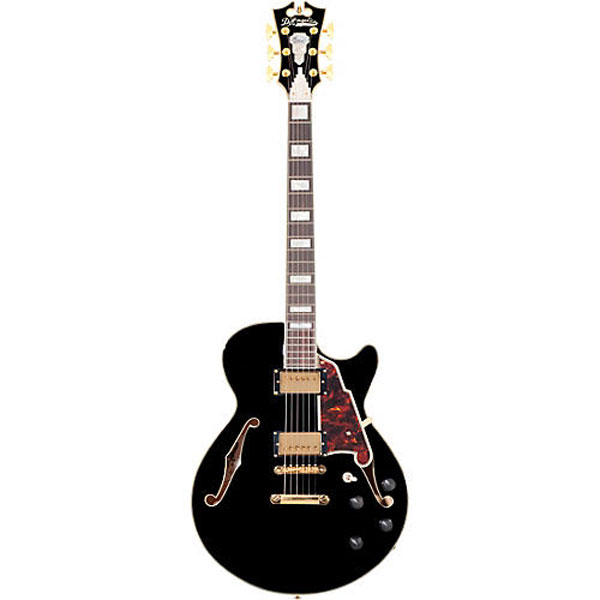
| Estimated Price | $2000 |
| Body Style | Single Cutaway |
| Top | Maple |
| Back and Sides | Maple |
| Neck | 3-piece Maple/Walnut |
| Fret Count | 22 |
| Pickups | USA Seymour Duncan 59 Humbucker |
My Review: D’angelico guitars are not as well-known as some of the other brands on this list, but they have been around as long as Fender and Gibson. D’angelico was a luthier-brand that produced the highest quality archtop guitars in the early 1900s, led by the legend John D’angelico.
They set the standard for many of the best archtop guitars and hollow-body guitars in the market. But after John D’angelico had a heart attack in 1959, D’angelico Guitars closed down the doors until their relaunch in 2014. The newly launched D’angelico guitars focused on more commercial guitars that many people can get access to around the world.
One of their signatures is the D’angelico Excel Series SS, and it’s a brilliant guitar that has a beautiful sound, looks, and mind-blowing versatility. I’ve been using this guitar for a couple of years now, and it’s one of the most comfortable and great-sounding guitars that I own.
Key Specs and Features: D’angelico recently upgraded this guitar in 2019, and there have been some major changes to the existing D’angelico Excel SS model. First off, the guitar body is made up of maple, and the neck is a C-shaped neck with 3-piece maple/walnut.
The guitar shape is still very similar to the old version, and it keeps its luxurious single-cutaway body shape with D’angelico signature pickguard attached to it. The guitar itself looks gorgeous because of its excellent finishes with gold electronics and hardware. The signature D’angelico headstock and block inlays only add to the luxuriousness of the D’angelico Excel SS.
The big change from the previous version is the bridge – the previous version has the D’angelico signature tailpiece while the new version has the Gibson-style tune-o-matic bridge with stop bar tailpiece. Other style tailpieces are available such as Bigsby style trem and D’angelico signature stair style tailpiece.
While the D’angelico signature tailpiece might look more extravagant, the Gibson-style tune-o-matic bridge with stop bar tailpiece tends to provide a more stable tuning and overall stability in the playing. The slim C neck profile also provides extreme comfort for bending, shredding, and playing big chords.
Electronics: The pickups on this guitar are USA Seymour Duncan 59 Humbucker, and these are very famous pickups known for delivering vintage P.A.F tone that brings you right back to the golden age of electric guitars.
These are the perfect fit for D’angelico Excel SS, and it provides a very reliable starting point for rock, blues, and jazz playing. D’angelico Excel SS has two volume knobs and two-tone knobs with a classic 3-way pickup switch. The new Excel SS also comes with the push/pull coil split option, which adds a lot more versatility to the tone.
Bottom Line: D’angelico Excel SS is an extremely luxurious and gorgeous instrument that also plays super comfortably, and most importantly, it plays beautifully. It’s great for getting that thick and warm blues and jazz tone, and it’s also great for overdrive and pop-style guitar playing.
The newly released D’angelico Excel SS can compete against any of the other high-end guitars on this list, and they are highly recommended to jazz and blues guitarists.

My name is Chris and I’ve had a passion for music and guitars for as long as I can remember. I started this website with some of my friends who are musicians, music teachers, gear heads, and music enthusiasts so we could provide high-quality guitar and music-related content.
I’ve been playing guitar since I was 13 years old and am an avid collector. Amps, pedals, guitars, bass, drums, microphones, studio, and recording gear, I love it all.
I was born and raised in Western Pennsylvania. My background is in Electrical Engineering, earning a Bachelor’s degree from Youngstown State University. With my engineering experience, I’ve developed as a designer of guitar amplifiers and effects. A true passion of mine, I’ve designed, built, and repaired a wide range of guitar amps and electronics. Here at the Guitar Lobby, our aim is to share our passion for Music and gear with the rest of the music community.

EB majesty is the ruler here.
Good day Chris,
I am an intermediate level guitar player, with Blues as my preferred music and I would like some advice on buying a high end guitar. Is this something you can help with?
thanks
Pointless ad related paid spot list when Collings isn’t mentioned. Gibson doesn’t make any guitar as well as Collings makes *every* cl deluxe.